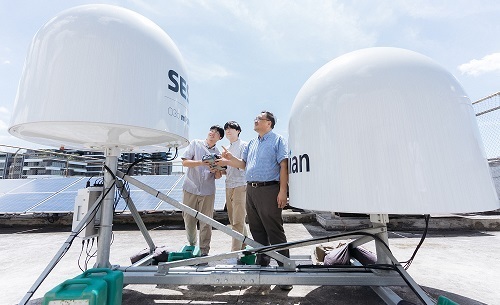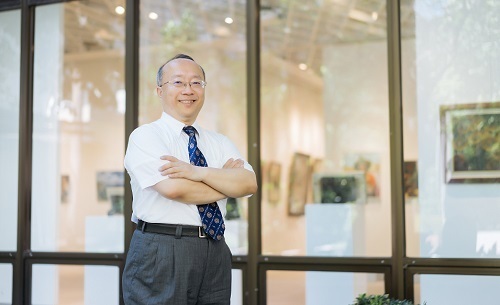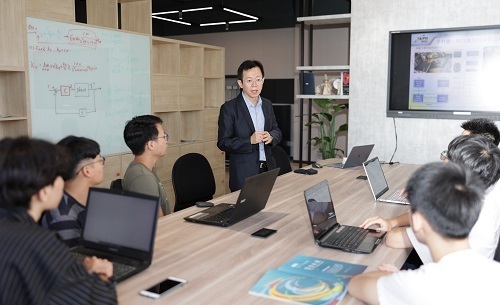2023 Taipei Tech Becomes a Pool of Talent for National Core Strategic Industries
Directly across the street from the Taipei Tech campus, the new Pioneer International R&D Building has a ground receiving station for low-orbit satellites on the roof, while the National Space Center and Pegatron are in full swing on different floors. All these are the preparations of Taipei Tech for the establishment of the Institute of Space System Engineering.
The only space systems engineering research institute at a technical college that focuses on the communications field
As a matter of fact, space is a core strategic industry of the country, and a war in Ukraine and Russia has brought global attention to low-orbit satellites. This year, Taipei Tech formally established the Institute of Space Systems Engineering, which focuses on satellite communication systems, communication payload technology, mobile ground receiving platforms, and firmware digital communication networks. Compared to other space research institutes, which are located under the College of Engineering and emphasize on teaching the mechanical field, ours is located in the College of Electricity and Information Technology and emphasizes more on 'communication' because communication is the soul of aerospace technology. Yuh-Shyan Hwang, Dean of Academic Affairs at Taipei Tech, explained.
Taipei Tech's connection to space comes from a long line of sources, said Yuh-Shyan Hwang, who said that Hsin-Piao, Lin, director of the Institute of Space Systems Engineering, has 10 years of experience working with the National Yang Ming Chiao Tung University's Forward-Looking Rocketry Research Center (ARRC) team, which is made up of several universities in China. Lin has 10 years of experience working with the National Yang Ming Chiao Tung University ARRC team, and is one of the core members of Taiwan's many successful hybrid rocket launches in recent years. The Taipei Tech team was one of the core members of the successful hybrid rocket launches in Taiwan in recent years, including last year's Pingtung Asahi Rocket Launch Mission.
On this basis, the Institute of Space Systems Engineering (ISE) has begun extensive cooperation with the industry and academia since September this year, when students officially started their studies. In addition to the National Space Center, the Institute has collaborated with OneWeb, a British low-orbit satellite manufacturer, as well as domestic companies such as MTI, WNC, UMT, WIN, and Pegatron. For the academic sector, Taipei Tech has also signed a MOU with Georgia Tech, a leader in the space field, where professors from Georgia Tech will come to the school in the future to conduct research and study together with teachers and students.
Yuh-Shyan Hwang highlighted that Taipei Tech's application to the Ministry of Education (MOE) for the establishment of the "Beyond 5G Low Orbit Satellite Critical Communication Module Industry Talent and Technology Incubation Base" has been approved by the MOE, and that the Space Systems Engineering Research Institute and the Talent Incubation Base will be integrated in order to enhance Taiwan's R&D in space technology and talent cultivation capabilities.
Semiconductor Technology Programs IC Design, Processing, and Equipment
It is worth noting that in addition to the space field, in September last year, in response to the "National Key Areas of Industry-University Cooperation and Talent Cultivation Innovation Ordinance", Taipei Tech also established the "Frontier Institute of Research For Science and Technology" to cooperate with enterprises to plan academic programs in key areas such as semiconductors, information security, and artificial intelligence, etc. Yuh-Shyan Hwang pointed out that, before the passage of the Innovation Ordinance, Taipei Tech combined the original faculties and resources of the six colleges in the university, such as electrical and electronic, electric, engineering, management, design, and humanities. Taipei Tech has combined the original faculty and resources of the six colleges of Electrical and Mechanical, Electricity, Engineering, Management, Design, and Humanities to establish the Frontier Institute of Research For Science and Technology, which is the first to offer programs in the fields of semiconductors, information security, and so on. Therefore, the passage of the ordinance and the establishment of the Frontier Institute is a natural progression. These programs and cooperation with the industry have not only continued, but also deepened."
If we take semiconductor as an example, other schools may only devote themselves to IC design and material processing, but Taipei Tech has included "equipment manufacturing" in addition to these two major fields. "For material processing, we have the Department of Chemical Engineering, Material and Resource Engineering; for IC design, we have the Departments of Electronics, Electrical Engineering, and Information Technology; and for equipment manufacturing, we have the Departments of Mechanical Engineering, Energy and Refrigeration Air Conditioning, and the R&D Center for Clean Technology. In equipment manufacturing, we have the Department of Mechanical Engineering, the Department of Energy and Refrigeration Air Conditioning Engineering, and the Clean Technology R&D Center.
Yuh-Shyan Hwang further pointed out that on the one hand, the school provides students with a good theoretical foundation, and at the same time, it also cooperates with enterprises such as TSMC, ASML, Micron, etc., such as arranging for students to go to the TSMC Newcomer Training Center, where they can learn how to operate the equipment, get to know and assemble various components, and those who have successfully completed the program and entered the workforce of TSMC will be able to receive an additional salary increase.
Due to the demand of TSMC and other companies to expand their factories abroad, this year, Taipei Tech also applied to the Ministry of Education for the International Semiconductor Degree Program, which is expected to enroll 15 local and 15 foreign students each, and to teach the classes in full English, "because companies are going to the U.S. and Europe to build their factories, and they need foreign students who are good at English. We are the only semiconductor institute that expects to enroll foreign students." Currently, Taipei Tech is targeting students from Malaysia, Singapore, the Philippines, the Czech Republic, Poland, Lithuania, and other South and East European countries.
Information security is national security. 10 teachers in the field, the most in Taiwan
In June, Taipei Tech announced the establishment of the Critical Infrastructure R&D Center in cooperation with the National Institute for Information Security, which will focus on critical infrastructures such as oil, water, electricity, railways, communications, and healthcare, and will assist in the establishment of security standards and testing procedures, as well as the cultivation of human resources. In teaching, the 10 teachers of information security will be divided according to their specialties, and then they will link up with the teachers of the university's master's degree program in intelligent railroad, electrical, electronic, biochemical and biomedical engineering institutes, and then they will propose solutions to the needs of different enterprises from railroads, electricity, communications, and medical care, etc., "In the past, most of the industry-academia cooperation was made by the enterprises to propose questions, and then the teachers would lead the students to do it, but now it is the enterprises that send their people to discuss the questions with our teachers and students. Now it is the enterprises that send people here to discuss with our teachers and students.
FIRST is a 10-year program, and Yuh-Shyan Hwang expects that by 2033, Taipei Tech will have trained more than 600 master's degree holders and 80 Ph.D.s. "Space, semiconductor, and information security are the core strategic industries of the country, which are not only important, but also promising for development, and the talents in these fields that are nurtured by Taipei Tech will definitely become the backbone of these industries in the future. The talents cultivated by Taipei Tech in the relevant fields will definitely become the backbone of these industries in the future.



Chinese Source:https://www.gvm.com.tw/article/105265
